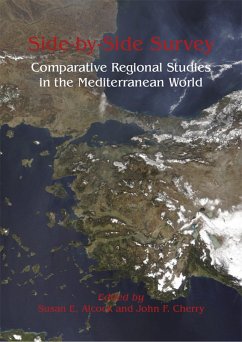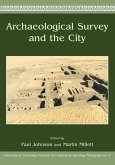Twenty years ago one of the editors of this volume, John Cherry of the University of Michigan, looked forward to a day when the 'Frogs round the Pond' (active intensive survey projects working around the Mediterranean) could produce real insights into the development of human societies by comparing and synthesizing the data they had collected. Despite the theoretical advances in survey methodology that have been discussed and implemented since that date, few scholars (with the exception of Sue Alcock, the other editor - also at Michigan) have attempted to use survey data to answer the real questions social historians have been asking. In this volume a number of prominent scholars re-commit to the original goal of intensive survey projects and discuss what original insights over twenty years of survey work have brought to our understanding of the Mediterranean world. Contents: Introduction (Susan E. Alcock and John F. Cherry); Intraregional and interregional comparison of occupation histories in three Italian regions; the RPC project (Peter Attema and Martijn van Leusen); A comparative perspective on settlement pattern and population change in Mesoamerican and Mediterranean civilizations (Richard E. Blanton); Site by site: Combining survey and excavation data to chart patterns of socio-political change in Bronze Age Crete (Tim Cunningham and Jan Driessen); Are the landscapes of Greek prehistory hidden? A comparative approach (Jack L. Davis); Accounting for ARS: fineware and sites in Sicily and Africa (Elizabeth Fentress, Sergio Fontana, Robert Bruce Hitchner, and Philip Perkins); Mapping and manuring: can we compare sherd density figures? (Michael Given); Mapping the Roman world: the contribution of field survey data (David Mattingly and Rob Witcher); Demography and survey (Robin Osborne); Problems and possibilities in comparative survey: a North African perspective (David L. Stone); Sample size matters! The paradox of global trends and local surveys (Nicola Terrenato); Side-by-Side and Back-to-Front: Exploring intra-regional Latitudinal and Longitudinal comparability in survey data. Three case studies from Metaponto, Southern Italy (Stephen Thompson); Solving the puzzle of the archaeological labyrinth: time perspectivism in Mediterranean surface archaeology (LuAnn Wandsnider); From nucleation to dispersal: trends in settlement pattern in the northern Fertile Crescent (T. J. Wilkinson, Jason Ur, and Jesse Casana); Comparative settlement patterns during the Bronze Age in the northeastern Peloponnesos (James C. Wright); Appendix. Internet resources for Mediterranean regional survey projects: a preliminary listing (Jennifer Gates, Susan E. Alcock, and John F. Cherry).
Dieser Download kann aus rechtlichen Gründen nur mit Rechnungsadresse in A, B, BG, CY, CZ, D, DK, EW, E, FIN, F, GR, HR, H, IRL, I, LT, L, LR, M, NL, PL, P, R, S, SLO, SK ausgeliefert werden.









